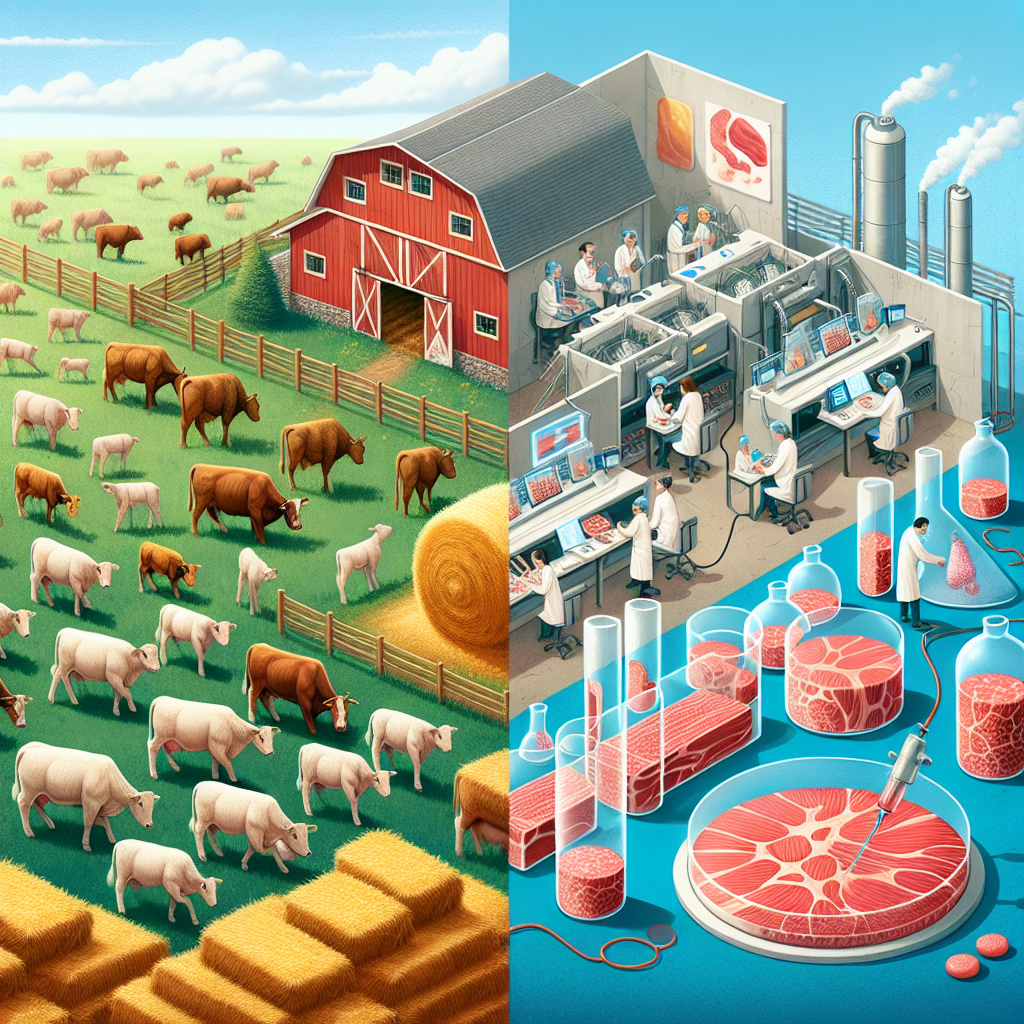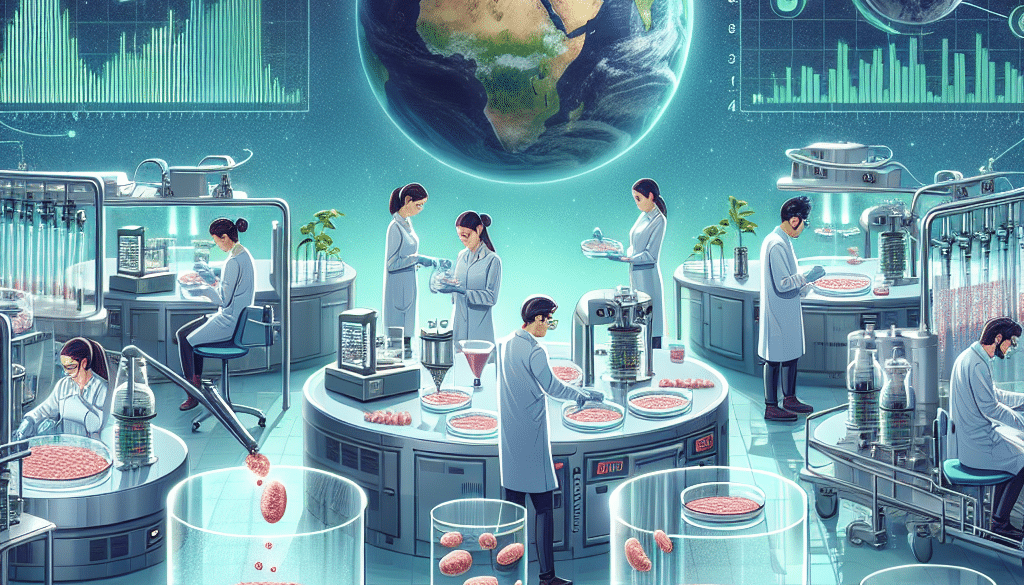Cultured Meat: A Sustainable Solution for a Growing Planet
-
Table of Contents
- Cultured Meat: A Sustainable Future for Our Growing Planet
- Understanding Cultured Meat
- The Environmental Case for Cultured Meat
- Health and Safety Benefits
- Economic and Ethical Considerations
- Challenges and the Road Ahead
- Conclusion: Cultured Meat as a Viable Alternative
- ETprotein: Your Partner in Sustainable Protein Solutions
Cultured Meat: A Sustainable Future for Our Growing Planet

As the global population continues to soar, projected to reach nearly 10 billion by 2050, the demand for protein-rich foods is increasing at an unprecedented rate. Traditional livestock farming is struggling to keep up with this demand, and it’s becoming increasingly clear that it’s not sustainable in the long run due to its significant environmental footprint. Enter cultured meat – a revolutionary technology that promises to produce meat without the need to raise and slaughter animals. This article delves into the world of cultured meat and explores its potential as a sustainable solution for our growing planet.
Understanding Cultured Meat
Cultured meat, also known as lab-grown meat, clean meat, or in-vitro meat, is produced by cultivating animal cells directly in a controlled environment. This process involves taking a small sample of animal cells and providing them with the nutrients and conditions they need to grow into muscle tissue, which is essentially what meat is. The result is a product that looks, cooks, and tastes like conventional meat but without the associated ethical and environmental concerns.
The Environmental Case for Cultured Meat
The production of traditional meat has a significant impact on the environment. Here are some compelling reasons why cultured meat could be a game-changer:
- Reduced Greenhouse Gas Emissions: Livestock farming is responsible for a substantial portion of global greenhouse gas emissions. Cultured meat has the potential to reduce these emissions by up to 96%, according to some studies.
- Lower Land and Water Usage: Cultured meat production requires significantly less land and water than conventional meat production. This could lead to a decrease in deforestation, habitat destruction, and water scarcity.
- Decreased Pollution: Traditional animal farming is a major source of pollution, including ammonia and methane emissions. Cultured meat production is a cleaner process that could minimize pollution and improve air and water quality.
Health and Safety Benefits
Beyond environmental advantages, cultured meat offers several health and safety benefits:
- Antibiotic Resistance: The overuse of antibiotics in livestock farming is a major contributor to the rise of antibiotic-resistant bacteria. Cultured meat production does not require antibiotics, which could help combat this global health threat.
- Foodborne Illness: Cultured meat is produced in sterile conditions, reducing the risk of contamination and foodborne illnesses associated with conventional meat.
- Controlled Nutrition: The nutritional profile of cultured meat can be controlled, potentially leading to healthier meat products with less fat and more beneficial nutrients.
Economic and Ethical Considerations
The shift to cultured meat also presents economic and ethical considerations that could reshape our food system:
- Job Creation: The cultured meat industry could create new jobs in biotechnology, manufacturing, and quality control, contributing to economic growth.
- Animal Welfare: Cultured meat eliminates the need for animal slaughter, addressing ethical concerns about animal welfare in the meat industry.
- Food Security: Cultured meat could provide a stable and efficient source of protein, enhancing food security, especially in regions where traditional meat production is not viable.
Challenges and the Road Ahead
Despite its promise, cultured meat faces several challenges that must be addressed:
- Scaling Up Production: Scaling up cultured meat production to meet global demand is a significant hurdle. It requires advancements in bioreactor technology and cost reductions.
- Regulatory Hurdles: Cultured meat must navigate complex regulatory landscapes to gain approval for sale in different markets.
- Consumer Acceptance: Public perception and acceptance of cultured meat will be crucial for its success. Education and transparency about the production process will be key.
Conclusion: Cultured Meat as a Viable Alternative
Cultured meat presents a compelling solution to the environmental, health, and ethical issues associated with traditional meat production. While challenges remain, the potential benefits are too significant to ignore. As technology advances and consumer awareness grows, cultured meat could play a pivotal role in creating a more sustainable and humane food system for our growing planet.
ETprotein: Your Partner in Sustainable Protein Solutions
As we explore sustainable alternatives like cultured meat, it’s also important to consider other protein sources that align with our environmental and health goals. ETprotein is a company that offers a range of high-quality, organic bulk vegan proteins that cater to various industries. Their products, including rice protein, pea protein, and various seed proteins, are non-GMO, allergen-free, and feature high purity levels, making them an excellent choice for those seeking sustainable protein options.
Whether you’re a manufacturer, trader, or distributor in the food and beverage, nutraceutical, or cosmeceutical industries, ETprotein can provide you with the protein solutions you need. Their commitment to quality and customer service makes them a trusted partner for businesses looking to innovate and offer sustainable products to their customers.
If you’re interested in learning more about ETprotein’s offerings or sampling their products, reach out to them at sales(at)ETprotein.com to discover how they can support your protein needs.
About ETprotein:
ETprotein, a reputable protein and L-(+)-Ergothioneine (EGT) Chinese factory manufacturer and supplier, is renowned for producing, stocking, exporting, and delivering the highest quality organic bulk vegan proteins and L-(+)-Ergothioneine. They include Organic rice protein, clear rice protein, pea protein, clear pea protein, watermelon seed protein, pumpkin seed protein, sunflower seed protein, mung bean protein, peanut protein, and L-(+)-Ergothioneine EGT Pharmaceutical grade, L-(+)-Ergothioneine EGT food grade, L-(+)-Ergothioneine EGT cosmetic grade, L-(+)-Ergothioneine EGT reference grade and L-(+)-Ergothioneine EGT standard. Their offerings, characterized by a neutral taste, non-GMO, allergen-free attributes, with L-(+)-Ergothioneine purity over 98%, 99%, cater to a diverse range of industries. They serve nutraceutical, pharmaceutical, cosmeceutical, veterinary, as well as food and beverage finished product distributors, traders, and manufacturers across Europe, USA, Canada, Australia, Thailand, Japan, Korea, Brazil, and Chile, among others.
ETprotein specialization includes exporting and delivering tailor-made protein powder and finished nutritional supplements. Their extensive product range covers sectors like Food and Beverage, Sports Nutrition, Weight Management, Dietary Supplements, Health and Wellness Products, and Infant Formula, ensuring comprehensive solutions to meet all your protein needs.
As a trusted company by leading global food and beverage brands and Fortune 500 companies, ETprotein reinforces China’s reputation in the global arena. For more information or to sample their products, please contact them and email sales(at)ETprotein.com today.












